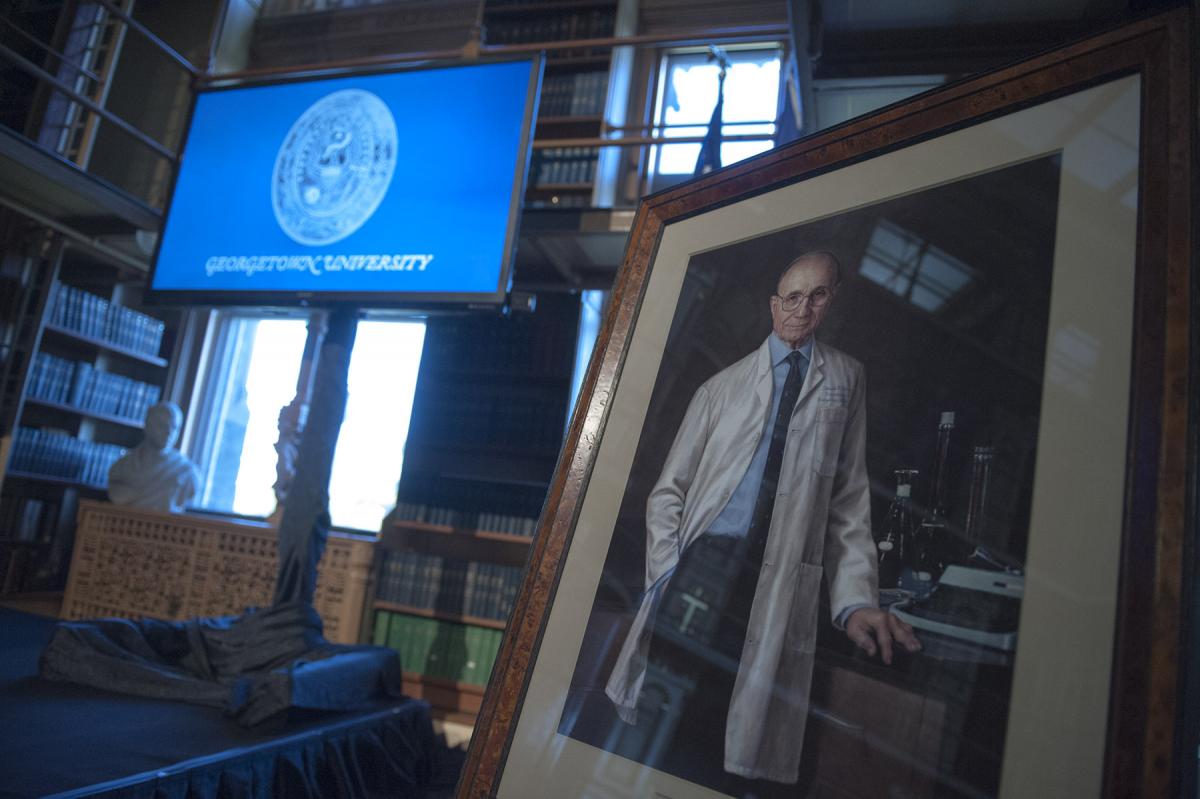Georgetown Bids Final Farewell to Pellegrino, Teacher and Legend

Posted in GUMC Stories
 The longtime professor and professor emeritus described as an icon of clinical bioethics – and who set the standard for all those he encountered – was remembered by devoted students, colleagues, friends and family members.
The longtime professor and professor emeritus described as an icon of clinical bioethics – and who set the standard for all those he encountered – was remembered by devoted students, colleagues, friends and family members.
On Oct. 18, Georgetown University Medical Center hosted a mass and memorial service to celebrate the legacy of Edmund D. Pellegrino, MD, MACP. Pellegrino died June 13 at the age of 92.
At the memorial service, the tone was more commemorative and nostalgic than somber, as speakers fondly recalled their interactions and lifelong lessons gleaned from Pellegrino.
Howard J. Federoff, MD, PhD, executive vice president of health sciences at Georgetown University Medical Center, served as master of ceremony at the memorial in Riggs Library. He introduced Georgetown President John J. DeGioia, PhD, who recalled when Pellegrino first came to Georgetown in 1982 – at the time, DeGioia was working as an assistant to then- president Rev. Timothy Healy, SJ.
“I was just getting started. Ed could not have been more kind to me, more generous with his counsel,” DeGioia said.
DeGioia described Pellegrino’s commitment to “the lived experience of dignity.”
“For Ed, the richness and complexity of human dignity was best understood as a lived experience, as an encounter between the principles of ethics and the practicalities of clinical care,” he said. “He created for us a framework to understand the profound and fundamental dignity of each human person.”
Pellegrino was also remembered by his former Georgetown colleague John Collins Harvey, MD, PhD, professor emeritus of medicine, who served as Pellegrino’s family physician. Harvey recalled his unique experience interacting with Pellegrino in a doctor-patient dynamic.
Daniel Sulmasy, MD, PhD, a former student of Pellegrino’s who now is associate director of the MacLean Center for Clinical Medical Ethics at The University of Chicago, lauded Pellegrino for “measuring up to his words.”
“Being an ethicist does not always make you a good person. But Ed was a good person,” Sulmasy said. He also noted how fitting it was that the day chosen to honor Pellegrino happened to fall on the Feast Day of Saint Luke, recognized by Catholics as the patron saint of physicians.
The memorial service culminated with words from G. Kevin Donovan, MD , who was hand-selected by Pellegrino to serve as director of Georgetown’s Pellegrino Center for Clinical Bioethics. Donovan said he was humbled and honored to have been chosen to lead the center that bears Pellegrino’s name—adding that he recognizes the responsibility that entails.
“If [Pellegrino’s] accomplishments are to continue to mean something, we must find a way to preserve and build on them. Fortunately we have no shortage of those here who can apply themselves to the task,” Donovan said. “Like a sower scattering seeds, Pellegrino scattered disciples—profligately—all over the medical landscape, the country and the world.”
The memorial was followed by a reception in Riggs Library, at which Federoff encouraged attendees to continue to share stories of Pellegrino.
Pellegrino was professor emeritus of medicine and medical ethics and senior scholar at Georgetown’s Kennedy Institute of Ethics . Considered one of the founders of bioethics and an early pioneer in teaching humanities in medical schools, he was the author of more than 600 published articles in medical science, philosophy and ethics and author or co-author of 23 books.
Discover more about the life and legacy of Edmund Pellegrino:
Click here to read a full accounting of Pellegrino’s professional accomplishments.
Click here for a link to a short video of reflections about Pellegrino, which was viewed during the memorial service.
By Lauren Wolkoff
GUMC Communications
